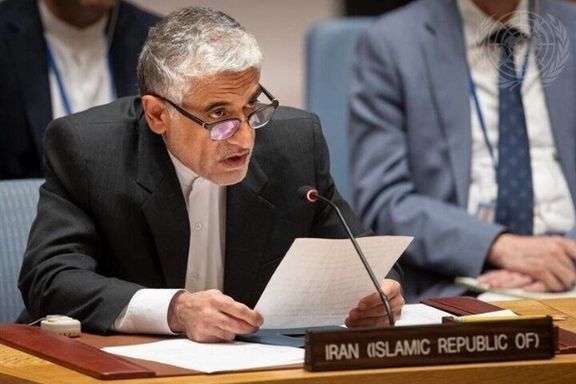Haniyeh, who had traveled to Tehran to participate in the inauguration of President Masoud Pezeshkian, was targeted in the early hours of Wednesday at a highly guarded compound at the foothills of high mountains in northern Tehran.
In a letter to the United Nations on July 31, Ambassador Amir Saeed Iravani described the attack as "a severe infringement on [Iran's] sovereignty" that violated international law.
"This rogue and terrorist regime and its accomplices bear responsibility. The Islamic Republic of Iran will not hesitate to exercise its inherent right to self-defense, as enshrined in Article 51 of the United Nations Charter to respond decisively and promptly.”
In letters to the United Nations in April, Iran used the same article as a basis for self-defense, before launching a missile and drone attack on Israel on April 13.
During that attack, Iran launched a volley of missiles and drones at Israel, claiming it was in retaliation for Israel's suspected deadly attack on its embassy compound in Damascus on April 1. However, nearly all of the projectiles were intercepted and shot down.
Denying the bombing scenario
IRGC-affiliated Fars news agency rejected on Wednesday a report by the New York Times about the assassination of Haniyeh, which said he was killed by an explosive device hidden in his room two months before the hit.
"These lies are being propagated while the results of the experts' investigation indicate that Haniyeh was struck by a projectile, in which involvement of the Zionist regime cannot be ruled out,” Fars said.
Iran's leadership has been clear about its intention to retaliate. Iran’s Supreme Leader Ali Khamenei said Israel “martyred our dear guest in our house … and prepared the ground for a harsh punishment for itself.”
General Mohammad Baqeri, Chief of Staff of Iran's Armed Forces, on Thursday said, "The Zionist regime will undoubtedly regret it."Baqeri also noted that Tehran is currently deliberating on the appropriate response to avenge the assassination of Haniyeh.
Ali Akbar Ahmadian, the secretary of Iran's Supreme National Security Council, told Iran's semi-official Mehr news agency, "All fronts of the resistance will take revenge for Haniyeh's blood."
Senior leaders of Iranian-backed groups in the region met Thursday in Tehran to discuss plans to retaliate against Israel, Washington Post reported, citing two individuals briefed on the talks.
Khamenei was present at the meeting, which also included officials from Hezbollah, Iraqi militant groups and other armed forces allied with Tehran, the report said.
The Biden administration is confident that Iran plans to retaliate against Israel for the recent assassination of Hamas political leader Ismail Haniyeh in Tehran and is preparing measures to counter such an attack, according to three US officials who spoke to Axios.
The Thursday report also added that US officials anticipate any Iranian retaliation will follow a similar pattern to their April 13 attack on Israel but could be larger in scale. They suggest that the response may involve the Lebanese Hezbollah.
"The Biden administration is concerned it may be more difficult to mobilize the same international and regional coalition of countries that defended Israel from the previous Iranian attack because Haniyeh's assassination is in the context of the Israel-Hamas war, which has drawn sharp anti-Israel sentiments across the region," added Axios.
In a call between President Joe Biden and Israeli Prime Minister Benjamin Netanyahu on Thursday, the White House reaffirmed its unwavering support for Israel’s security against threats from Iran and its proxies, including Hamas. According to a readout released by the US, they discussed enhancing Israel’s defense capabilities, including deploying new military defenses.
Senator Lindsey Graham shared the readout on X saying that "it is always good for any American administration to reassure Israel that we have their back against Iran and their proxies and will provide the necessary defensive capability."
However, he argued that "it is long past time to start talking about offense when it comes to Iranian threats against Israel, the United States, and the world."








